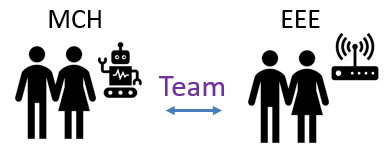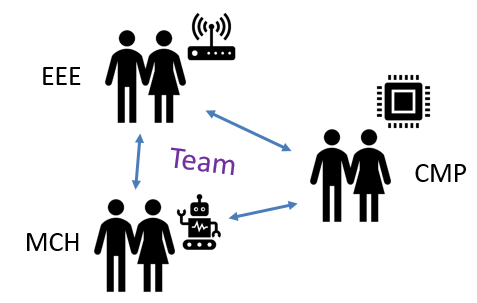Capstone projects are designed to support project teams that typically consist of four to six
students collaborating between two or three departments. This allows projects to have a
broad scope bringing together knowledge and skills from different disciplines.
Interdisciplinary teams
Capstone teams consist of at least two departments (department sub-teams) each with at least
two students. In the following example, two Mechatronics Engineering department students
form an MCH sub-team which will work on the robotic sub-system, and two Electrical and
Electronics Engineering department students form an EEE sub-team which will work on the
communications sub-system.
At a minimum, projects consists of 2+2 students,

but can include a larger number of departments

A sub-team is mainly responsible for a sub-system of the project, therefore, for some
projects, it may make better sense to define a sub-team according to the task rather than
the department. For example, a communications sub-team which is responsible for the
communications sub-system; such a team could consist of students from the same department or
different departments.
All team members are expected to function as a coherent team that works towards the overall
success of the project.
Participating departments and knowledge areas
Participating departments are listed below together with the student knowledge areas
particular to the departments. We also encourage collaboration with industry and other
faculties.
- Artificial Intelligence Engineering (AIN)
Knowledge areas: machine
learning;
deep learning; image processing; computer vision; speech recognition; natural language
processing; expert systems; data analysis and visualization; intelligence in games,
robotics and business
- Biomedical Engineering (BME)
Knowledge areas: biomedical
instrumentation and
medical device design, human biomechanics, human body movement analysis, therapeutic and
assistive devices, medical imaging and image processing, clinical engineering and
hospital organization.
- Civil Engineering (CEN)
Knowledge areas: structural engineering,
materials
science, geotechnical engineering, water resources, surveying, transportation
engineering; design, construction, and maintenance of the physical and natural built
environment, including buildings, roads, bridges, dams, and canals.
- Computer Engineering (CMP)
Knowledge areas: Algorithms and software
development, operating systems, embedded systems, computer networks, database management
systems, computer vision and machine learning.
- Electrical and Electronics Engineering (EEE)
Knowledge areas: power
systems,
motors and actuators, communication, electrical and electronic circuits and systems,
sensors and signal processing, control, embedded systems, electromagnetics and optics.
- Engineering Management (ENM)
Knowledge areas: financial analysis,
financial
markets, marketing analysis, marketing positioning, marketability, project management,
project design and management, entrepreneurship, startup, innovation, Human resource,
performance valuation, leadership.
- Energy Systems Engineering (ESE)
Knowledge areas: sustainability,
renewable
energies, multigeneration, hydrogen energy, energy and exergy analyses, energy
conversion-management-storage, thermodynamics, hydrogen fuel cells (PEM fuel cells),
hydrogen production, catalyst design and characterization, biofuels, solar
photocatalysis for water decontamination, solid waste management, micro grid, system
modelling and control, power converters for renewable energy systems, motor control.
- Industrial Design (Partners from the Faculty of Architecture and
Design)
Knowledge areas: User analysis, contextual and value
analysis of products, material and production technology, human factors and design
psychology, storytelling and interaction design, experience design, service and system
design, 3D visualization and communication of products, marketability and design
management, project design and management, entrepreneurship, startup, innovation.
- Industrial Engineering (INE)
Knowledge areas: manufacturing
systems,
mathematical programming, scheduling, multi-criteria decision making, simulation,
operations research, optimization-based decision support system, supply chain
management, strategic management, quality control, production planning and control,
project management, facilities planning, project management.
- Mechatronics Engineering (MCH)
Knowledge areas: robotics,
mechanical design,
signal processing, data acquisition, sensors and actuators, embedded computer systems,
power systems and batteries, thermo-fluids, hydraulics and pneumatics, feedback control,
acoustics and vibrations.
- Software Engineering (SEN)
Knowledge areas: Software application
development, game design, mobile application development, human-computer interaction,
database management systems, software testing and measurement, machine learning,
software architecture design.
Who can/must take this course ?
Those who satisfy one of the following conditions:
- You are expected to be a 4th grade student.
- You must be in graduation status according to the total remaining local credits.

